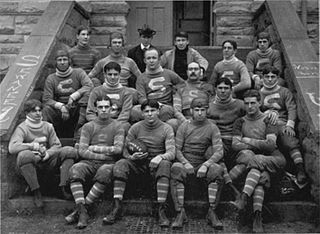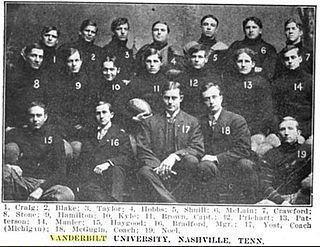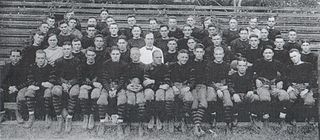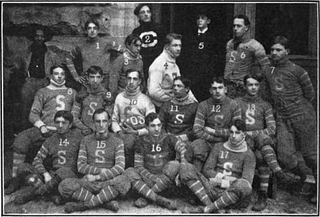Related Research Articles

The 1899 Sewanee Tigers football team represented Sewanee: The University of the South in the 1899 Southern Intercollegiate Athletic Association football season. Sewanee was one of the first college football powers of the South and the 1899 team was one of its best. The 1899 Tigers won 12 games and lost none, outscored opponents 322–10, and won the Southern Intercollegiate Athletic Association (SIAA) title.
The 1902 Tennessee Volunteers football team represented the University of Tennessee in the 1902 Southern Intercollegiate Athletic Association football season. The Volunteers won a school record six games in 1902 and beat rivals Sewanee and Georgia Tech. The team was guided by a new head coach, Hubert Fisher, who came from Princeton University, as did his predecessor, George Kelley.

The 1915 Vanderbilt Commodores football team represented Vanderbilt University during the 1915 Southern Intercollegiate Athletic Association football season. Dan McGugin served his 12th season as the Commodores' head coach. Vanderbilt was a member of the SIAA. They faced a 10-game schedule. Vanderbilt scored 459 points in its first seven shutout games, and 514 points in 510 minutes of actual playing time by season's end, making it a legitimate "point-a-minute team" leading the nation in scoring with a school record still unequaled today.

The 1903 Vanderbilt Commodores football team represented Vanderbilt University during the 1903 Southern Intercollegiate Athletic Association football season. James R. Henry coached Vanderbilt for one season in 1903. His squad finished the season with a 6–1–1 record. The season was marred only by the upset loss to Cumberland. John J. Tigert and Bob Blake were both Rhodes Scholars.

The 1905 Vanderbilt Commodores football team represented Vanderbilt University during the 1905 Southern Intercollegiate Athletic Association football season. The team's head coach was Dan McGugin, who served his second season in that capacity. Members of the Southern Intercollegiate Athletic Association, the Commodores played six home games in Nashville, Tennessee and finished the season with a record 7–1 overall and 6–0 in SIAA, outscoring their opponents 372–22. Vanderbilt played seven home games and won them all including six shutout victories.

The 1906 Vanderbilt Commodores football team represented Vanderbilt University during the 1906 Southern Intercollegiate Athletic Association football season. The team's head coach was Dan McGugin, who served his third season in that capacity. Members of the Southern Intercollegiate Athletic Association (SIAA), the Commodores played seven home games in Nashville, Tennessee at Curry Field, and finished the season with a record of 8–1 overall and 5–0 in SIAA.
The 1907 Vanderbilt Commodores football team represented Vanderbilt University during the 1907 Southern Intercollegiate Athletic Association football season. The team's head coach was Dan McGugin, who served his fourth season in that capacity. Members of the Southern Intercollegiate Athletic Association, the Commodores played five home games in Nashville, Tennessee and finished the season with a record 5–1–1 and 3–0 in SIAA.

The 1902 Vanderbilt Commodores football team represented Vanderbilt University during the 1902 Southern Intercollegiate Athletic Association football season. W. H. Watkins was in his second year coaching Vanderbilt. Vanderbilt was playing in its 13th season of football. The Commodores had wins over Cumberland, Ole Miss, Central of Kentucky, Tennessee, Washington University, Kentucky, Tulane and LSU. The Tulane and LSU contests were played with one day's rest between games for the Commodores.

The 1920 Vanderbilt Commodores football team represented Vanderbilt University during the 1920 college football season. The team's head coach was Dan McGugin, who served his 16th season in that capacity. Members of the Southern Intercollegiate Athletic Association (SIAA), the Commodores played five home games in Nashville, Tennessee, and finished the season with a record 4–3–1 and 3–3 in the SIAA. The Commodores outscored their opponents, 134–124.

The 1924 Vanderbilt Commodores football team represented Vanderbilt University in the 1924 Southern Conference football season. The 1924 season was Dan McGugin's 20th year as head coach. Members of the Southern Conference, the Commodores played six home games in Nashville, Tennessee, at Dudley Field and finished the season with a record of 6–3–1. Vanderbilt outscored its opponents 150–53. Fred Russell's Fifty Years of Vanderbilt Football dubs it "the most eventful season in the history of Vanderbilt football."
The 1901 Vanderbilt Commodores football team represented Vanderbilt University during the 1901 Southern Intercollegiate Athletic Association football season. The Commodores were coached by Walter H. Watkins in his first year as head coach.
The 1910 Vanderbilt Commodores football team represented Vanderbilt University in the sport of American football during 1910 college football season. In Dan McGugin's 7th year as head coach, the Commodores as members of the Southern Intercollegiate Athletic Association (SIAA) compiled an 8–0–1 record and outscored their opponents 165 to 8, winning a conference championship.
The 1911 Vanderbilt Commodores football team represented Vanderbilt University in the 1911 college football season. It was Dan McGugin's 8th year as head coach. The team outscored its opponents 259 to 9, winning an undisputed Southern Intercollegiate Athletic Association (SIAA) title.

The 1912 Vanderbilt Commodores football team represented Vanderbilt University in the 1912 college football season. The 1912 season was Dan McGugin's ninth year as head coach. Members of the Southern Intercollegiate Athletic Association (SIAA), the Commodores won their third straight conference title this year, posting an 8–1–1 win–loss–tie record. The team played its home games at Dudley Field. It used the short punt formation as its offensive scheme.
The 1916 Vanderbilt Commodores football team represented Vanderbilt University in the 1916 Southern Intercollegiate Athletic Association football season. The 1916 season was Dan McGugin's 13th year as head coach. Quarterback Irby Curry was selected third-team All-America by Walter Camp.
The 1919 Vanderbilt Commodores football team represented Vanderbilt University in the 1919 college football season. The 1919 season was Dan McGugin's 15th year as head coach. McGugin was returning from his stent in the Army during World War I where he was relieved by interim head coach Ray Morrison. Josh Cody was selected third-team All-America by Walter Camp, for the second time.

The 1909 Sewanee Tigers football team represented Sewanee: The University of the South during the 1909 Southern Intercollegiate Athletic Association football season. The team was coached by Harris G. Cope in his 1st year as head coach, compiling a record of 6–1 and outscoring opponents 160 to 42 to win the Southern Intercollegiate Athletic Association title. Sewanee beat the previous season's champions LSU and Auburn, and upset rival Vanderbilt, handing the school its first loss to a Southern team in six years.

The 1898 Sewanee Tigers football team represented Sewanee: The University of the South during the 1898 Southern Intercollegiate Athletic Association football season. The team was coached by John Gere Jayne in his second year as head coach, compiling a record of 4–0 and outscoring opponents 56 to 4 to win the Southern Intercollegiate Athletic Association title. Due to misgivings over Virginia and North Carolina playing ringers, Caspar Whitney declared Sewanee the best team in the South.

The 1903 Sewanee Tigers football team represented the Sewanee Tigers of Sewanee: The University of the South in the 1903 Southern Intercollegiate Athletic Association football season.
The 1901 Nashville Garnet and Blue football team represented the University of Nashville during the 1901 college football season. The second of first two opponents is unknown. The 1901 team was likely the best football team in Nashville's history. Coached by Charley Moran, though they lost to southern power Vanderbilt, they "mopped up with about everything else."
References
- ↑ "Vanderbilt's downfall; Varsity beats Southern Champions". The Cincinnati Post. October 17, 1898. Retrieved April 28, 2024– via Newspapers.com.
- ↑ "Fast work wins it; Fleetness of the Georgia players defeats Vanderbilt's eleven there". The Nashville American. October 30, 1898. Retrieved April 28, 2024– via Newspapers.com.
- ↑ "Victory for Vanderbilt". Chattanooga Daily Times. November 6, 1898. Retrieved April 28, 2024– via Newspapers.com.
- ↑ "Victory for the Orange and Blue". The Courier-Journal. November 13, 1898. Retrieved April 28, 2024– via Newspapers.com.
- ↑ "C.U. is victorious". The Nashville American. November 20, 1898. Retrieved April 28, 2024– via Newspapers.com.
- ↑ "Sewanee defeats Vanderbilt". The Birmingham Age-Herald. November 25, 1898. Retrieved April 28, 2024– via Newspapers.com.
- ↑ "Vanderbilt Official Athletic Site - Football". Archived from the original on September 30, 2011. Retrieved April 4, 2012.
- ↑ Woodruff 1928 , p. 77
- ↑ "The Football Teams of the South". The Courier-Journal. October 2, 1898. p. 18. Retrieved August 14, 2008– via Newspapers.com.

- 1 2 http://kdl.kyvl.org/catalog/xt786688h87r_7/viewer Archived February 2, 2017, at the Wayback Machine ?
- 1 2 3 4 5 "Up Goes Sewanee's Purple". The Tennessean. November 25, 1898. p. 5. Retrieved May 16, 2016– via Newspapers.com.

- ↑ "How Teddy Roosevelt Saved Football".
Additional sources
- Woodruff, Fuzzy (1928). A History of Southern Football 1890–1928. Vol. 1.